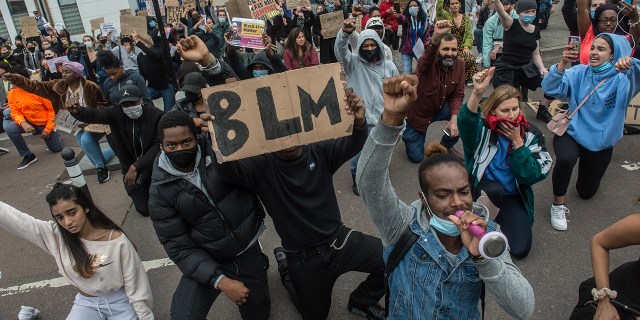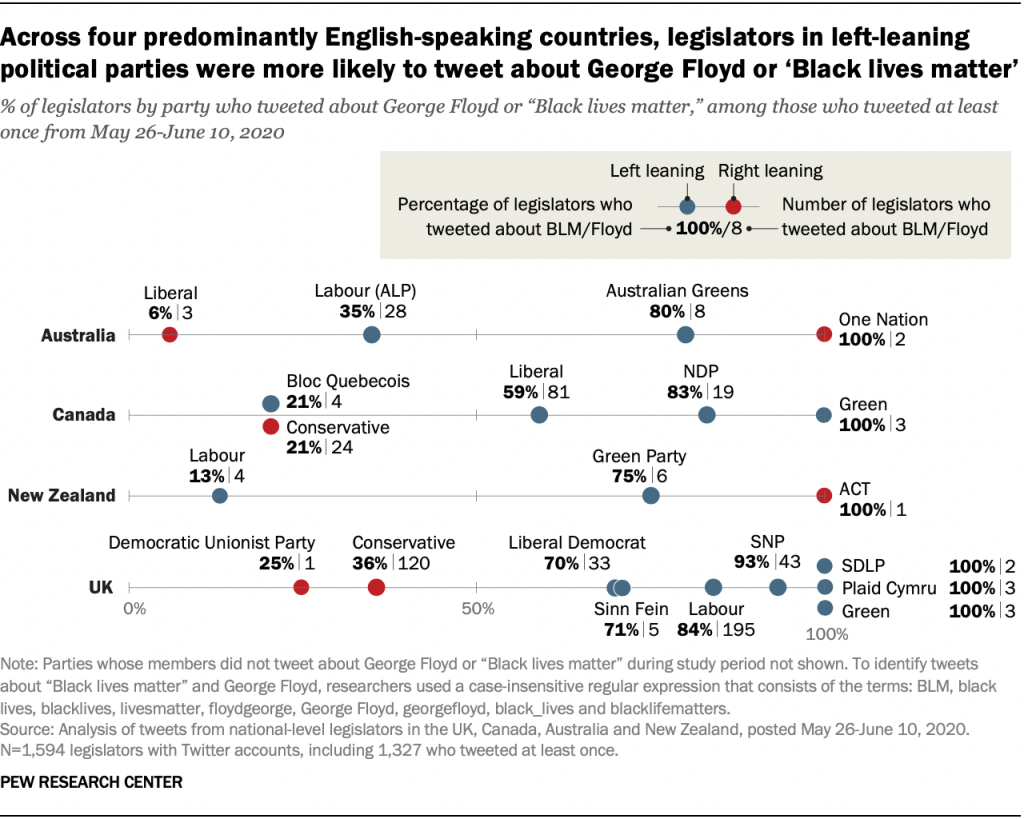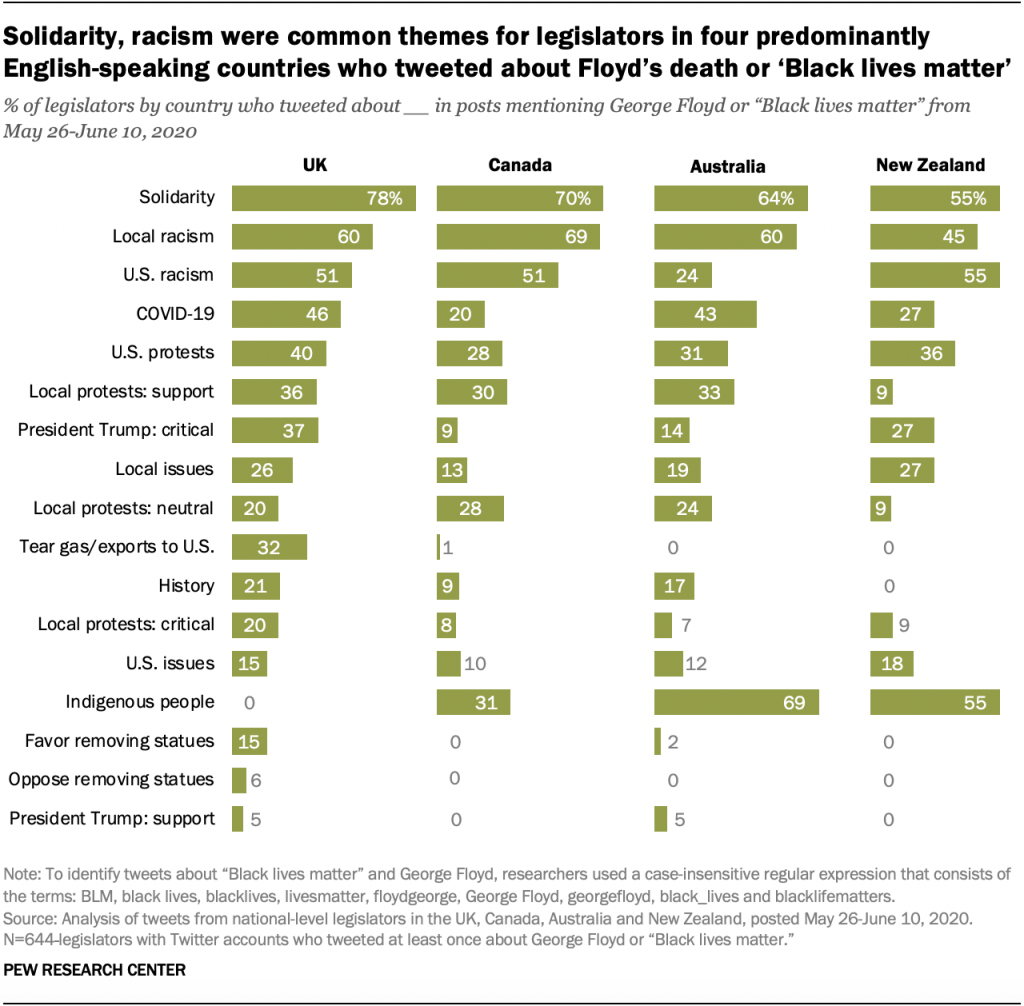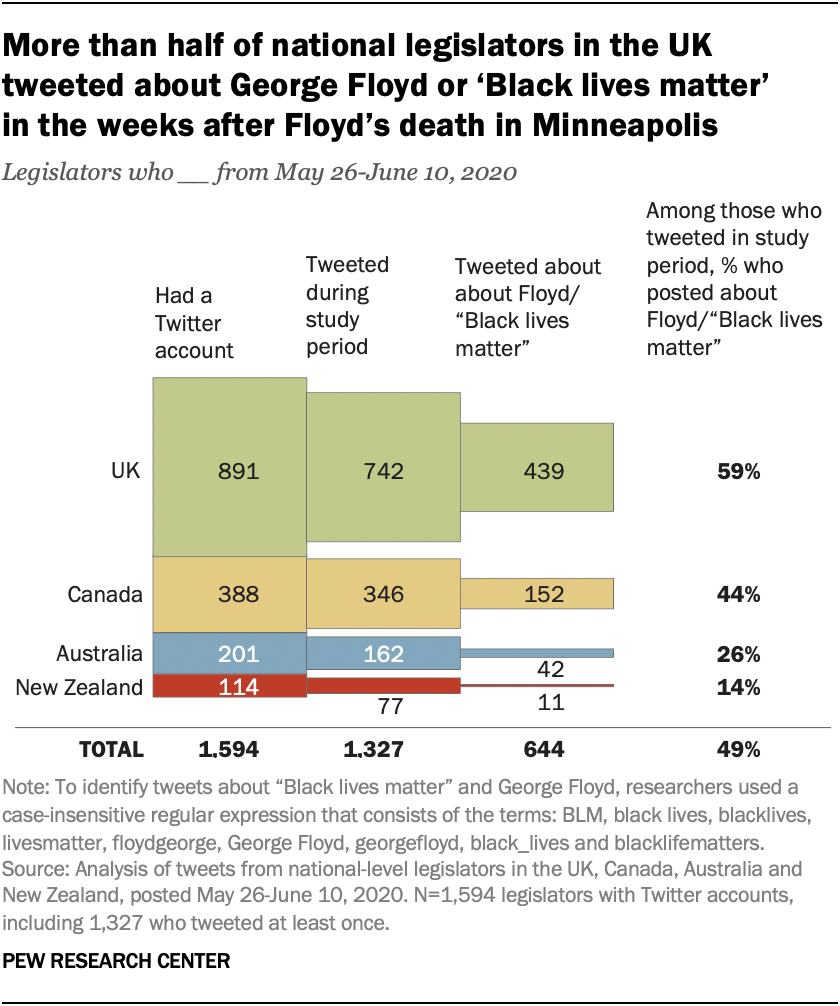
Protests and debates over racism and police brutality have spread far beyond America’s shores since the death of George Floyd at the hands of a Minneapolis police officer on May 25. And public officials have joined the discussion in many countries – including in four nations where Pew Research Center has been tracking the Twitter activity of national legislators for much of the past two years.
Indeed, many legislators in these four countries – Australia, Canada, New Zealand and the United Kingdom – directly addressed Floyd’s killing and the subsequent protests on their Twitter accounts, according to a new analysis by the Center. The analysis looks at predominantly English-speaking countries where lawmaker tweets can be analyzed in a standardized way, but these nations are far from the only ones where Floyd’s death has commanded attention among political leaders.
A 59% majority of British members of Parliament who tweeted between May 26 and June 10 posted about Floyd or used the phrase “Black lives matter” or the #BlackLivesMatter hashtag, according to the new analysis. Smaller percentages of national legislators in Canada (44%), Australia (26%) and New Zealand (14%) did so, too.
Pew Research Center conducted this analysis to learn more about how the death of George Floyd reverberated internationally, including among elected officials. This analysis examines 99,500 tweets from 1,594 national-level officials in parliaments in the United Kingdom, Canada, Australia and New Zealand. It excludes heads of government, but includes both upper and lower legislative chambers, where applicable. The research team collected every tweet posted by these legislators between May 26 and June 10, 2020, using the Twitter API.
To identify tweets about Floyd and “Black lives matter,” researchers used a case-insensitive regular expression – a pattern of keywords and text formatting – that consists of the terms: BLM, black lives, blacklives, livesmatter, floydgeorge, George Floyd, georgefloyd, black_lives and blacklifematters. This pattern identified 4,058 tweets as mentioning George Floyd or “Black lives matter.” After accounting for false positives, researchers analyzed 4,024 tweets in the final dataset.
Researchers created legislative rosters by hand, manually identifying all sitting members in each country’s national legislature and then searching for their Twitter accounts. These lists have been continually updated to account for elections, resignations, legislators changing parties and other events. Legislator accounts in the database include official, verified legislator accounts as well as any unofficial accounts that belong to the legislator, such as personal or campaign accounts. See the full methodology for more details.
As protests over Floyd’s death have spread across continents, most legislators in the four studied countries who posted about Floyd or “Black lives matter” expressed solidarity with demonstrators. And though some commented on discrimination in the United States or criticized how President Donald Trump handled the situation, many used the occasion to discuss racism and the rights of people of color in their own countries.
Below is a closer look at how legislators in these four countries addressed Floyd’s killing and the associated protests. For a look at how members of the U.S. Congress addressed Floyd’s killing and the aftermath on social media, see our related blog post here.
Which legislators tweeted about George Floyd?
Among legislators in Australia, Canada, New Zealand and the UK who tweeted at least once in the two weeks after Floyd’s death, about half (49%) mentioned George Floyd by name or used variants of the phrase “Black lives matter” or the #BlackLivesMatter hashtag.
In the 16 days following Floyd’s death, tweets related to these subjects peaked in each of the four countries in the week immediately after. By comparison, during the 17-month period prior to these events, only 4% of legislators across these four countries had tweeted about “Black lives matter.”

Across these four countries, the share of legislators who were active on Twitter from May 26 to June 10 and referenced Floyd or “Black lives matter” was generally highest among legislators on the left of the ideological spectrum.
In the UK, the country with the highest share of legislators discussing these topics, at least seven-in-ten legislators from each left-leaning party did so. In Canada, the three legislators from the left-leaning Green Party – each of whom sent at least one tweet during this time – all mentioned the movement, as did majorities in the country’s left-oriented New Democratic Party and Liberal Party (83% and 59%, respectively). In Australia, legislators from left-leaning Australian Greens party were the most active about these themes, with 80% mentioning them. And in New Zealand, members of the left-leaning Green Party were the most likely to have tweeted about the issues, too, though only 13% of members of the left-leaning Labour Party did so.
Legislative retweets of “Black lives matter” or Floyd-related content generally followed party lines, with legislators in these countries most often retweeting posts written by fellow party members. For example, about two-thirds of tweets from Canada’s Liberal Party were retweets, and around half of those retweets were of posts from other Liberal legislators. Likewise, in the UK, roughly a quarter of all tweets related to Floyd or “Black lives matter” from the Labour Party were retweets of fellow Labour members of Parliament.
Some themes were common in legislators’ tweets

In all four countries, “solidarity” was the most frequent sentiment expressed by legislators who tweeted about Floyd or “Black lives matter” between May 26 and June 10. The share of legislators expressing solidarity – either with Floyd and his family or with anti-racism protests – ranged from 78% in the UK to 55% in New Zealand. Across all four countries, 75% of legislators who mentioned Floyd or his killing in their tweets focused on themes related to solidarity.
Around a third (36%) of legislators in the four countries who tweeted about Floyd’s killing and racism commented on the protests spreading across the U.S. About 30% discussed Trump and his handling of the protests – with seven times as many posts critical, as opposed to supportive. In the UK, 32% of British legislators who tweeted about Floyd or “Black lives matter” lobbied for banning tear gas, rubber bullets and riot gear sales from the UK to the U.S.
Around half of legislators (49%) commented broadly about racism in the U.S.; even more (62%) used hashtags and references to “Black lives matter” and Floyd to turn their eyes toward racism in their own country. For example, some legislators drew upon examples of U.S. racism to criticize their own country in the same tweet, including one widely shared tweet from a Labour MP in Norwich South in the UK:
In Australia and New Zealand, discussions of local racism emphasized Indigenous peoples: 69% of Australian legislators and 55% of New Zealand legislators discussed issues facing these local populations. In the UK, around a quarter of legislators (23%) discussed racism and COVID-19 against the backdrop of a new report from Public Health England, which highlighted racial inequities in coronavirus-linked mortality.
Around half (52%) of the legislators discussed the protests that were roiling their own countries following the waves of U.S. protests. By a roughly two-to-one margin, more tweets were supportive of local protests than critical of them, although about a third were neutral, focusing more on sharing pictures or news events related to the protests than expressing judgment about them.
Legislators in right-leaning parties like One Nation in Australia and the Conservative Party in the UK were more likely to criticize the protests. About 5% of legislators who criticized the protestors did so with references to COVID-19. Some legislators expressed fears about large crowds gathering amid the outbreak, while others said allowing protestors to march was unfair or a double standard, given other restrictions in place.
Legislators also used Twitter between May 26 and June 10 to bring historical issues to the fore. Nearly one-in-five legislators who tweeted about Floyd’s killing or “Black lives matter” did so to highlight slavery, imperialism or injustice in their own nation’s past. This included a particular focus on monuments in the UK, where on June 7 a statue of a slave trader, Edward Colston, was pulled down and dumped in the Bristol harbor. One-in-five British legislators tweeted about monuments and statues, with more than twice as many supportive of removing statues that might be offensive than critical of it. Only Conservative Party members tweeted opposition to removing the statues.
Note: Here is the methodology for this report.



